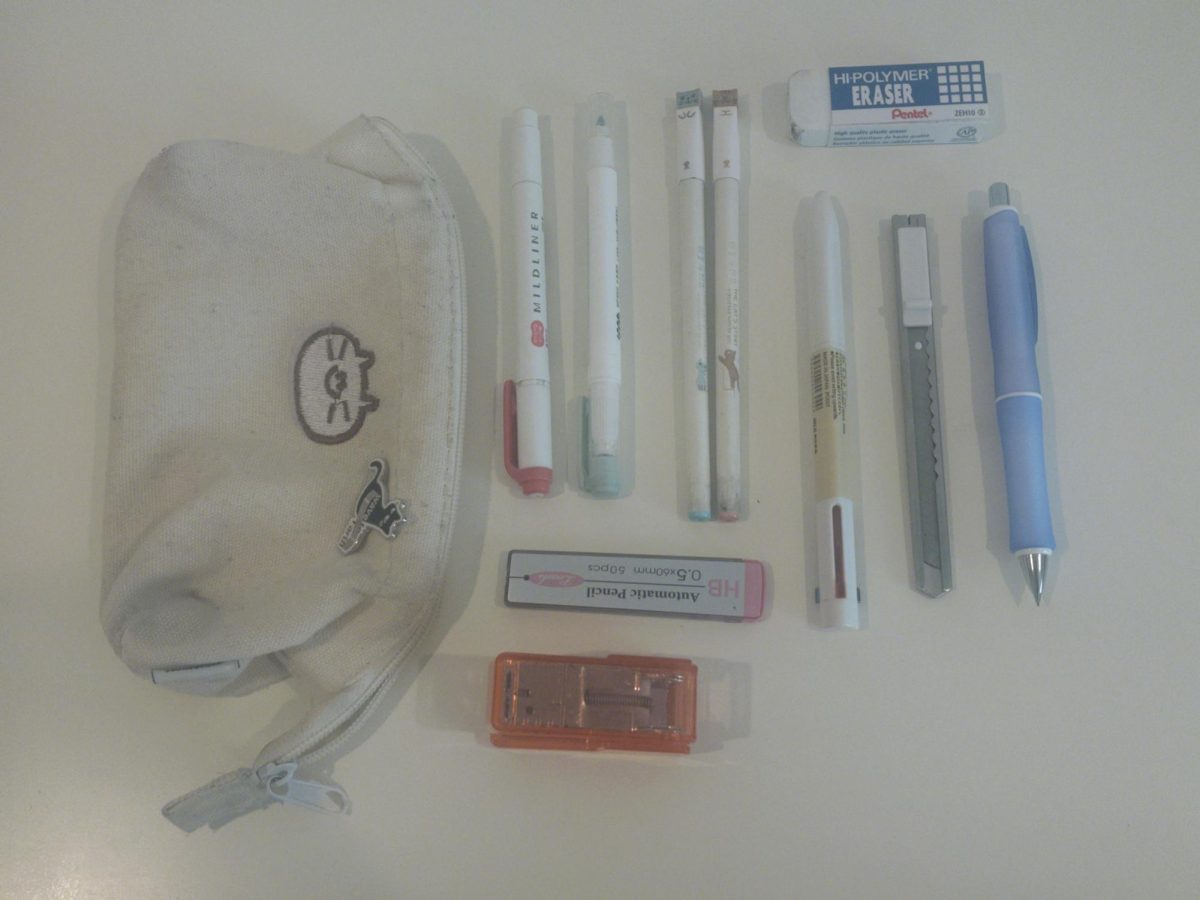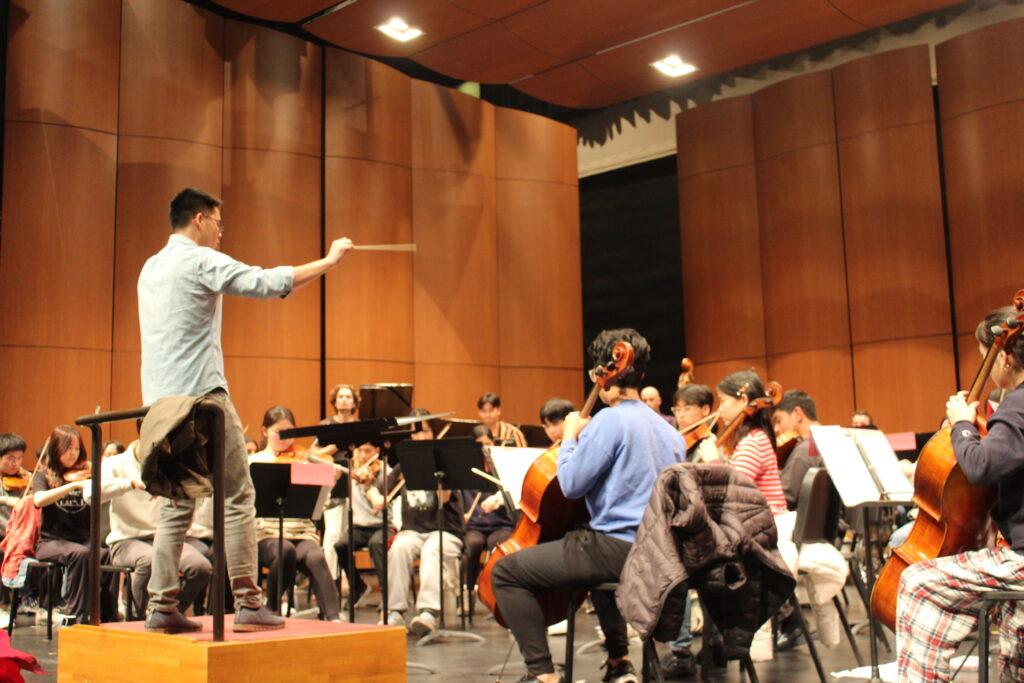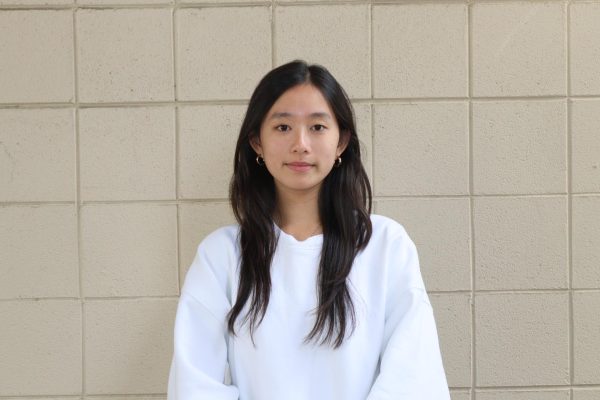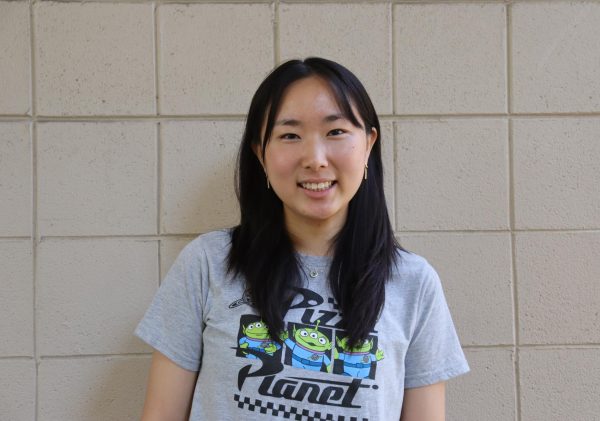This fall, members of Saratoga Strings (SS) — the highest audition-level orchestra in the music program — have been spending their fourth-period classes and two Wednesday evenings per month rehearsing in preparation for their performance at the highly acclaimed 77th Midwest Clinic International Band, Orchestra and Music Conference in Chicago from Dec. 20-22. Each year, between 18,000 to 20,000 participants representing 44 countries and all 50 states attend the conference.
Video by Kathy Wang
Orchestra practices in the mcafee during their fourth period.
Because the conference coincides with finals week, the 52 students in the orchestra are having to take their finals early or make other arrangements in advance. While taking early finals has caused stress for some, others say they’re dealing with the situation as best they can.
“I think it is worth it because I’m still taking finals even though it is complicated moving everything up a week, but Midwest clinic is something that the entire orchestra and even the band really wanted to go to, so I think it’s more of an honor to even be going,” junior Nathan Lee, a trumpet soloist, said.
At the clinic, the orchestra will perform nine pieces — the fourth movement of “Symphonic Serenade in B-flat Major” by Erich Wolfgang Korngold, “Song for UhmMa” by Dr. Soo Han, the fourth movement of “Concerto for Piano, Trumpet and Strings” by Dmitri Shostakovich featuring [jump] freshman Eric Lin playing piano and Nathan Lee playing trumpet, “Cello Concerto No. 2 in D Major” by Josef Haydn, “Be Ever the Hope” by Jay Kennedy, “Starlit Fantasy” by Tony Glausi, “A Joyous Christmas” by Ludwig Van Beethoven, “Banner” by Jesse Montgomery and “Atom Heart Club Suite No. 1” by Takashi Yoshimatsu.
“Cello Concerto No. 2 in D Major” will feature guest soloist Class of ‘19 alumnus Thomas Lim, who is currently finishing his master’s degree at The Juilliard School. Additionally, three of the nine pieces — “Song for UhmMa,” “Starlit Fantasy” and Kennedy’s “Be Ever the Hope” — are world premieres and feature guest composers, Han and Glausi.
According to director Michael Boitz, Han’s “Song for UhmMa” is inspired by a Korean folk song that Han’s mother sang to him throughout his childhood. Because of the piece’s cultural background, it holds a unique kinship with the international community in the Bay Area, he said. Han is also a board member of the Midwest Clinic director and a director of orchestral studies at the Reva and Side Dewberry Family School of Music at George Mason University.
“Starlit Fantasy” is a jazz-style piece composed by Glausi, a former Saratoga student. He is a world-renowned trumpet player who has produced 12 records. Since jazz pieces are not typically performed by string orchestras, Boitz emphasized how performing the piece would push the musicians out of their comfort zone.
“In terms of style of music, the only thing we have that’s a unique American art form is jazz,” Boitz said. “Everything else comes from another place or country, so it’s the only thing we sort of own as a nation. Having [Glausi] writing a piece for string orchestra and jazz combo was the premise for it.”
While Han’s piece portrays a heartfelt family story, Kennedy’s “Be Ever the Hope” tells a more romantic one. Kennedy, a Northwestern alumnus and a close friend of music teacher Jason Shiuan, wrote the piece in honor of his wife. He met her during the COVID-19 pandemic and started communicating with her over email and text. During the early stages of their relationship, Kennedy wrote the piece “Be Ever the Hope” — which is abbreviated by her middle name, Beth.
At the clinic, several colleges, including Carnegie Mellon University, Northwestern University and the University of Indiana, will be looking to recruit talented musicians for their musical departments. Since each college will set up booths and allow students to visit their admissions officers.
Because the orchestra has taken on a large and challenging repertoire, Boitz expects difficulty with the technicalities of a few pieces, specifically “Concerto for Piano, Trumpet and Strings” and “Banner.” Junior Ian Kim, the principal bassist of SS, believes that the difficulty of the pieces is “spread out,” meaning that though some pieces are challenging, others are relatively simple.
“The more challenging pieces are definitely harder to play than what I’ve played in an orchestra before, but not so hard to the point that it’s impossible,” Kim said. “I think the biggest challenge comes from the sheer amount of pieces that we perform as maintaining many pieces at a high level is difficult.”
Despite the orchestra’s ability to play the pieces at a high level, Kim feels that they haven’t yet reached the level they hoped they would. During rehearsals, he has seen how the orchestra is sometimes unable to maintain the progress they gained during the previous rehearsal, hindering them from achieving their full potential.
“If we can just get another couple of rehearsals working on specific spots and reminding ourselves of notes that we took during class, I believe that the pieces would be so much better,” Kim told The Falcon in early December.
Despite these kinds of obstacles in mastering the difficult repertoire, Boitz trusts that Saratoga Strings will be in good shape for the conference.
“I think getting to perform with this kind of challenge, this kind of audience, and this kind of exposure is a lot of pressure,” Boitz said. “But that’s kind of where the group is at; it’s a sophisticated group of students with really bright kids and I think if we did anything less to challenge them, we’d be failing them. They’re just an awesome group of kids.”






























